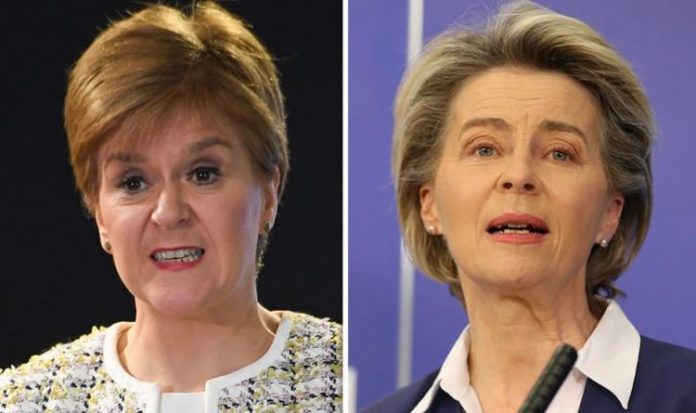Scottish First Minister Nicola Sturgeon is determined to hold a second referendum on independence in 2021 but Prime Minister Boris Johnson is firmly resisting the pressure. The SNP’s goal is for Scotland to leave the UK so the country can rejoin the EU. However, while Brexit might have made the case for Scottish independence stronger, it has also made it practically more difficult.
Scotland would need to apply to join again under Article 49 of the Treaty of the European Union.
Scottish ministers accept they would have to go through an “accession process” for EU membership and want to start this “as soon as possible”, despite several questions hanging over whether the country would even be able to join as an independent state.
New members can only be allowed into the bloc through a unanimous vote from the existing member states and an independent Scotland would undoubtedly ruffle feathers.
Spain is struggling with secession demands itself, from Catalonia, so is unlikely to support a newly independent state.
Scotland could also be rejected due to its current deficit of seven percent of GDP, unless it adopted a strict austerity programme from the EU as well as the euro.
There is only one part of the UK, which, according to one of Britain’s foremost constitutional historians, will be able to automatically rejoin the bloc.
Professor Vernon Bogdanor told Express.co.uk: “The Belfast Agreement was conceived in the context of both Britain and Ireland remaining member states of the EU.
“Brexit, therefore, is likely to have consequences for the Agreement, in terms of North/South collaboration, the border between Northern Ireland and the Republic, and indeed for the whole philosophy of power-sharing which lies at the basis of the Agreement.
“Northern Ireland, which voted to remain in the EU, is indeed in a unique position in the EU.
“If it did decide to join with Ireland, the European Council has agreed that the entire territory of the united island of Ireland would be part of the EU.
“Northern Ireland, therefore, is the only part of the UK that could secede and rejoin the EU without need to re-negotiate entry.”
He noted: “Scotland would probably get in as well, but there might be terms agreed beforehand.”
JUST IN: EU Commission bends retirement age rules to give Barnier Brexit job
Former Brexit Secretary David Davis echoed Professor Bogdanor’s claims in 2017, when he said that the UK Government’s position, in the event of a future border poll in favour of a united Ireland, was that should the people of Northern Ireland vote to leave the UK, they would “be in a position of becoming part of an existing EU member state, rather than seeking to join the EU as a new independent state”.
According to a new series of polls, more than half of people in Northern Ireland want a referendum on a united Ireland in the next five years.
day Times commissioned a series of surveys across the four nations of the UK to gauge attitudes towards the Union.
The findings highlight some of the difficulties facing Mr Johnson as he struggles to keep the country together.
In Scotland, the poll found 49 percent backed independence compared to 44 percent against — a margin of 52 percent to 48 percent if the undecideds are excluded.
In Northern Ireland, 47 percent still want to remain in the UK, with 42 percent in favour of a united Ireland and a significant proportion — 11 percent — undecided.
However, asked if they supported a referendum on a united Ireland within the next five years, 51 percent said yes compared to 44 percent who were against.
DON’T MISS
Blair, Clegg and Major met with EU leaders to stop UK’s withdrawal [INSIGHT]
Macron plot exposed in plan to get Germans to pay for political union [REVEALED]
SNP’s independence bid crushed: ‘Don’t even have money for buses’ [EXCLUSIVE]
Irish News columnist and historian Brian Feeney said the latest poll result had “clearly rattled unionism”.
He said the results demonstrated a marked increase in support for unification and a growing appetite for a border poll.
He said: “day Times/LucidTalk figures not only show majority support for holding a poll in five years but a surge in support for Irish unity, in fact almost doubling support in previous findings.
“This will put pressure on the British Government to come clean on what criteria it will use to honour its obligation to call a poll, which the current Northern Irish Secretary has recently avoided.”
Meanwhile, Northern Ireland’s First Minister Arlene Foster has said a border poll on a united Ireland would be “absolutely reckless.”
The DUP leader also said it is “very disappointing” to see some nationalist parties across the UK talk about constitutional politics during the Covid-19 pandemic.







